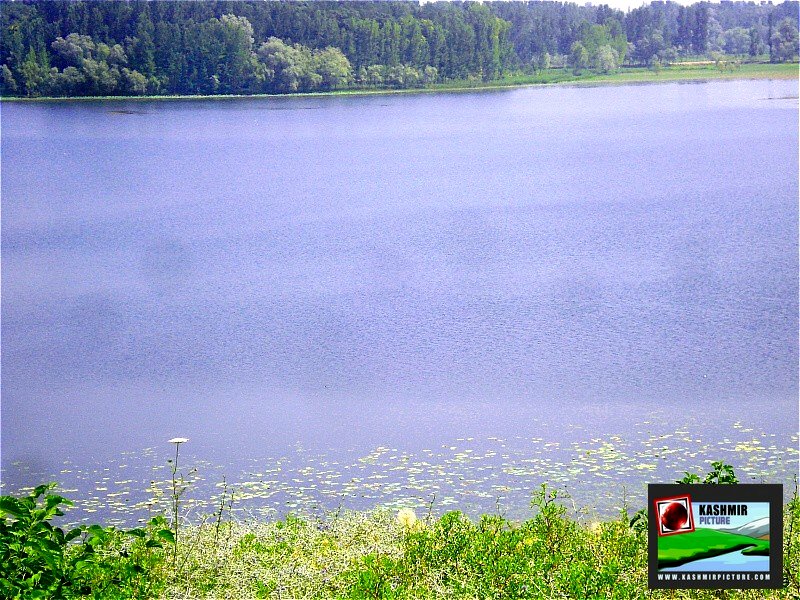Fed by numerous streams and springs, Wullar Lake facilitated combination of capture and culture fisheries and till a few decades ago was main source of fish production in Kashmir. The lake possessed nine commercially important fish species including native Schizothorax. However, in absence of any conservation measures, population of fish species has been gradually declining. "This lake has turned into a cesspool," said Ghulam Muhammad Bhat, an aged fisherman living on the banks of Wullar at Zurmanz village. Bhat says he used to catch 50-60 kilograms of fish on an average per day till a few decades ago. "Nowadays, I just catch 10-15 kilograms in two-three days," Bhat said.
Heaps of garbage and animal carcasses dot various areas of Wullar, affecting its flora and fauna.
"Authorities have been acting as mute spectators to Wullar's deterioration," said Ghulam Hassan Bhat, president of local fishermen association. With over 3000 active fishermen dependent on Wullar for livelihood, their per capita income has decreased by 20 times with average annual household income decreasing to less than Rs 20,000.
"Pollution of Wullar has severely affected our livelihood and pushed hundreds of fishermen on the verge of starvation," said Bhat.
A survey conducted by an environmental consultancy, Wetland International South Asia, states that the resource mapping trends of Wullar signify drastic decline in its fish catch from 10,544 to 1476 metric tons over the past 50 years.
"Large quantities of sewage discharged from Srinagar city and major towns into the lake has resulted in increased euthrophication which has adverse impacts on the growth and development of fisheries in general and sensitive species Schizothorax in particular," it states.
Dean, Faculty of Fisheries, SKUAST Kashmir, Dr Masood H. Balkhi, attributed decline in fish production in Wullar to multiple factors including degradation and pollution of water quality as a result of siltation, surface run-off from the catchments bringing large quantities of pesticides and insecticides, used as fertilizers in the fields, into the lake.
"Besides influx of non-biodegradable materials into the lake through the in-flow channels, encroachment on the lake banks destroys breeding grounds of the fish especially Schizothorax species," Dr Balkhi said. He blamed the indiscriminate fish catching by the fishermen, especially during the breeding season, for decline in the fish production.
"I attribute all these devastating factors humans. Unless we wake up in time to protect our resources in a coordinated manner and overpower our lust for self, we may not be able to save anything for ourselves and the posterity," he added.
Pollution has also taken a heavy toll on Nadru and other water crops besides affecting habitat of migratory birds. Owing to its location, at the western extremity of the Himalayas, the lake has been an important flyway and staging ground for migratory birds including shorebirds, gadwall, cranes, ducks, geese and pintails which migrate to Kashmir to ward off extreme cold in their summer homes in Siberia and Central Asia.
In recognition of its immense ecological and socio-economic importance, the Wullar was designated as wetland of international importance under the Ramsar Convention in 1990.
The migratory birds use the lake for feeding during the night when there is no disturbance from fishermen or hunters while, during day, they seek refuge in Hokersar and nearby wetlands. From March to June, large areas of Wullar and the floating vegetation, trees, bushes and reed beds serve as breeding and nesting sites for some of the bird species.
Experts said encroachment and pollution of the lake over the years has affected the habitat of migratory birds.
"The littoral zone of the lake support emergent, floating and submerged vegetations that provide food niches to large flocks of waterfowl populations and other birds. Wullar is alarmingly shrinking due to heavy deposition of silt from the catchments, besides nutrients of agriculture fields and sewage from the surrounds, thus affecting its flora and fauna and disturbing habitat of migratory birds," said Muhammad Shafi Bacha, an environmentalist and Chairman, Wildlife Conservation Fund.
Source: Greater Kashmir, 9 April 2014
http://www.greaterkashmir.com/news/2014/Apr/9/wullar-losing-aquatic-lif…

- Log in to post comments
